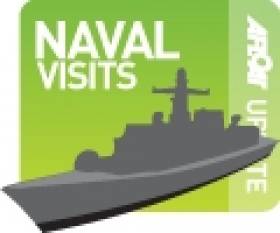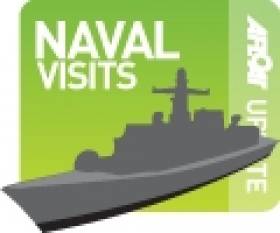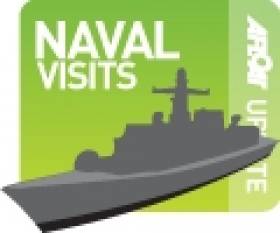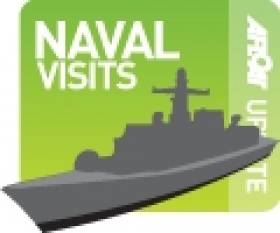Displaying items by tag: PSP Cormoran
Sistership of Figaro Race ‘Guardship’ to Visit
#NAVAL VISIT – A sistership of the French Naval patrol vessel that performed 'guardship' duties during last year's La Solitaire du Figaro Race to Dun Laoghaire (click HERE), is due to dock in Dublin Port in advance of St. Patrick's weekend, writes Jehan Ashmore.
PSP Pluvier (P678) is a 54m offshore patrol vessel (OPV) that belongs to a trio of the'Flamant' class, the remaining pair are the leadship PSP Flamant (P676) and PSP Cormoran (P677). The latter OPV escorted the race fleet on the second leg between Ouistreham (Caen) to Dun Laoghaire, the only international port of call of the prestigious race.
The naval visitor is the last of the sisters built and was constructed in Cherbourg at Chantier des Constructions Mécaniques de Normandie (CMN). She entered service in 1997 and carries out patrols in seas up to 200 nautical miles offshore of the French économique exclusive zone (ZEE).
She is scheduled to arrive on Thursday afternoon and berth at Sir John Rogersons Quay, downriver from the Samuel Beckett swing-bridge.
Naval School-Ships to take Class to Dublin
#NAVAL VISITS - The first foreign naval visitors to Dublin Port in 2012 will be the French Navy, as five of an eight-strong class of school-training ships from Brest are due to dock on Friday, writes Jehan Ashmore.
The octet belong to the Léopard class though the namesake leadship, Léopard (A 748) and Jaguar (A 750) will not be forming as part of the visiting flotilla.
Those that will be making the weekend port of call, berthing at Sir John Rogersons Quay will be Panthère (A 749) and Lynx (A 751) both commissioned in 1982 and the remaining quartet Guépard (A 752); Chacal (A 753); Tigre (A 754) and Lion (A 755) which entered service the following year. For a photo of the latter vessel and one of her sisters the Chacal click HERE.
Each of the 44 tonnes vessel's measure 17.5m long and have a beam of 6.40m and drawing a draft of 2.40m. To read more on the class characteristics click HERE.
The class follow in the wake of the last French Naval vessel to enter Dublin Bay, PSP Cormoran (P677). The OPV provided guard-ship duties when accompanying the Solitaire du Figaro race fleet during the stopover to Dun Laoghaire Harbour last August, as previously reported on Afloat.ie
French OPV ‘Guard-ship’ to Follow Figaro Fleet From Dun Laoghaire
The 447 tonnes OPV provides communication liaison and assistance should the forty six sailors require during the arduous race including SAR. As such the vessel can deploy a rapid response high speed RIB-craft from an internal dock-well located at the stern.
Otherwise the RIB is used to board fishing vessels as part of fishery monitoring duties and patrolling France's Exclusive Economic Zone out to 200 nautical miles (370 km). She is a Flamant class OPV and was built in 1997 by the Cherbourg based shipyard Constructions Mécaniques de Normandie. The 54m/177-ft craft is equipped with two 12.7mm machine guns.
As Dun Laoghaire is the only international port of call during the four-leg stages of the 1,695 nautical miles (3,390kms) the hosting of the Irish harbour is a welcomed boost to the sailing community and the local economy. Leading off the Carlisle Pier are pontoons where the one-design boats are moored and opposite is the East Pier jetty berth where the PSP Cormoran is docked.
Also at the East Pier is a festival market which is part of the Festival des Bateaux. The three-day festival ends tomorrow and was organised by the race-hosts the National Yacht Club, the Dun Laoghaire Harbour Company and Dun Laoghaire Rathdown County Council. For further festival details click HERE.
The presence of a foreign naval visitor to the harbour was more commonplace particularly during festivals held in the 1980's. In addition to the French, navies from Belgium, The Netherlands were regular festival participants.
- National Yacht Club
- Solitaire du Figaro
- Dun Laoghaire Harbour Company
- Dun Laoghaire Rathdown County Council
- Dun Laoghaire Harbour
- French Navy
- Festival des Bateaux
- Dun Laoghaire Harbour News
- Naval Visits
- PSP Cormoran
- Dun Laoghaire East Pier
- Dun Laoghaire pierheads
- Guardship
- Dun LaoghaireSables d'Lonne
- Vedee
- Dun Laoghaire Festivals
French Naval Vessel Escorts 'Figaro' Fleet to Dun Laoghaire
To celebrate the stopover of the four-stage 1,695 nautical mile (3,390 km) race, Dun Laoghaire Rathdown County Council, Dun Laoghaire Harbour Company and the National Yacht Club have joined forces to create the Festival des Bateaux (12-14 Aug).
A festival highlight will be a fireworks display which be held on Friday night at 10pm on the East Pier. In addition during the three-day festival programme includes live bands, street entertainment and a market on the Carlisle Pier. For more details and times of the free event go to www.dlrevents.ie
Visitors to the East Pier can take a closer view of the PSP Cormoran from the quayside where the 23 knot offshore patrol vessel (OPV) will be berthed. The Flamant class (OPV) entered service in 1997 after completion by Constructions Mécaniques de Normandie, Cherbourg, where the 477 tonnes vessel is based.
The 54m/177-ft vessel has two 12.7mm machine guns and is used for fishery monitoring, SAR and patrolling France's Exclusive Economic Zone out to 200 nautical miles / 370 km. In addition she is equipped with a high speed RIB-craft that can be deployed from an internal dock-well at the stern.
































































